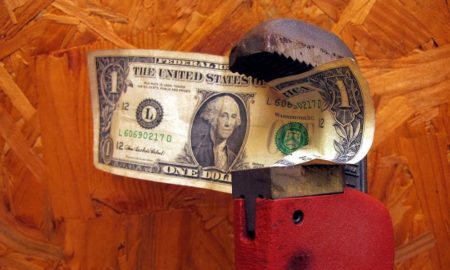

Remember your first real job, when you stopped earning $7.25 an hour at the neighborhood’s fast food chain and started negotiating a yearly salary? I bet you felt like a millionaire. I know I did.
My first job out of college paid around $50,000. Almost $1,000 a week, or $25 an hour! That was more money than I had ever made.
But after working for a few months, it didn’t seem like there was much more money flowing in than before. Don’t get me wrong, life was a bit easier. By just a bit.
I decided to look at reasons why my millionaire bubble had burst. Turns out, it was because of the additional hidden costs of having a real job that most of us never think about.
How Much Are You Really Making Per Hour?
When I was flipping burgers, I enjoyed:
- A free uniform, and a stipend to clean it.
- No commute, it was 100 yards away.
- Free health plan.
- A free meal or two before and after my shift.
- Discounted movie tickets and other fun goodies.
- Getting to clock in an out. This meant that I’d get paid for every extra minute I worked. It actually became a game with my co-workers to wash your hands for two minutes after our shift was up. When is a restaurant going to blame you for caring about hygiene? That added up to almost an hour every month. Yes, a whopping $8. But after 5 hours, extra hours were paid at 150%. That was getting interesting.
- Zero stress outside of work hours. After work, I hung up my cap and went home to live my life.
At my so-called $25 per hour job, my boss gave me a smartphone and would call me even on holidays if an emergency arose.
I had to dress smart, I bought a bike to cycle to work, then a scooter, and when I traveled for work, I was not paid extra hours.
At first it’s all glamorous to jet all over and stay at hotels, but believe me, it gets old quick. After six months of not sleeping in my bed three nights a week, and eating crap from hotel cafeterias, I was seriously thinking I was underpaid.
The Hidden Costs Of A “Real” Job
Making $25 per hour doesn’t mean you get $25 in your pocket for every hour worked. To figure out your real hourly rate, you need to take into account all expenses that are work related.
There is the higher tax bracket, now that you are making a real living. Then the cost of going to and from work.
In addition to the car payment (or savings towards a car replacement), insurance, repairs, maintenance and gas, don’t forget to include the time spent commuting. Two hours a day on top of an eight hour day means you’re actually engaging in work related activities for ten hours.
That’s a serious hit to your hourly rate right there.
Let’s keep going, how about day care for the kids, the new suit you bought, the lunches out with colleagues, the peer pressure to buy Bob a retirement gift or a lottery ticket from Mary’s kids? These are the obvious work related costs.
Some less obvious expenses can include:
- That Chinese take out you order every Wednesday because you’re off work late and too tired to cook.
- Lunches out when you forgot to brown bag them.
- Extra grooming so you look sharp at the office.
- The massage you can’t live without when you’re too stressed.
- The tutor you need to pay because you can’t free up an hour to do maths with your eldest.
- The landscaping company.
- The guy who changes your oil, walks your dog, delivers your dry-cleaning, and everything else you’re too exhausted or too busy to do.
And. So. On. Working is expensive!
It’s not just employees who have hidden working costs either. At first glance, $50 earned in two hours freelancing from home in your pyjamas is much closer to making $25 per hour.
Then again, you would have to add up all the time spent looking for clients, pitching clients, reading the brief and understanding their needs, making revisions to your work, invoicing them, doing your own accounting and tax returns, or the cost of outsourcing such tasks.
By the time you sum up all the hidden costs of working life, your $25 hourly rate is probably down to $15. Meaning that’s $10 you pay every hour for the privilege of doing your job.
Your hourly rate will be even less if you work a lot of extra hours for free, which is the case in many demanding professional jobs. What they conveniently forget to mention when you accept that fancy 6 figure salary as a 1st year associate at a big law firm is that you’ll probably work 50%+ the amount of hours of a typical 9-5er.
Depressing, isn’t it?
So Should We Give Up On Career Advancement To Flip Burgers?
Having a great job is not actually bad of course. Not only do you earn a higher gross income, but working in a career-level position does come with other benefits.
For example, if you want to buy a house, getting a mortgage is significantly easier if you are a salaried employee rather than an hourly employee because of the way lenders calculate your income. Same goes for refinancing student debt or consumer debt at a lower interest rate, because lenders favor the steady track record of a career-level salaried position.
There’s also the potential for profit sharing, 401k matching, healthcare benefits, as well as perks like a company car, company phone, and relocation allowances. Of course, it’s human tendency to think about all the benefits of your job, without stopping to consider the hidden costs. But without thinking about your hidden costs, you can’t make truly informed financial decisions.
My real hourly wage calculation was really meant for you to realize two things:
First, you probably earn less than you think. Sorry if I’m the bearer of bad news, but you had to find out what you really make. When you’re about to buy a $1,000 laptop and think “oh, I’ve just had to work for a week to buy it!”, think twice, and crunch the numbers again, based on your real hourly rate.
It might be a good exercise to figure out when you’re really getting your money’s worth out of a purchase.
Second, assuming you aren’t accumulating consumer debt, you are probably already living on less than you think. Sometimes, you think you’d like to quit that horrible office job and go back to a simpler, less demanding job around the corner, or become self-employed, but shrug it off because you are convinced you can’t make it work on half your income.
You May Be Closer To Freedom Than You Think
If you are ready to take care of the kids again, ditch the second car and run errands with your better half, and spend your newfound free time saving the household some money, you probably can live on one salary without too many lifestyle changes.
I hope it also made you reconsider the sacrifices you make to keep your job. Hours in traffic, away from your family, maybe when you turned down that $40,000 job five minutes from home, you didn’t ponder all the work related costs, and the $10,000 difference is mostly going into gas and day care, lowering your quality of life?
Finally, from a retirement perspective, this analysis shows you are actually able to live on $15 an hour. Or around $30,000 a year.
So when you make your financial independence projections, instead of thinking you need to replace that $50,000 income, you can seek to replace only $30,000.
At the safe withdrawal rate of 4%, you only need a $750,000 nest egg to completely replace the real hourly earnings from your job, instead of $1,250,000.
That’s half a million dollars you won’t have to save for in order to live comfortably in retirement. That is 10 years of $50,000 yearly earnings!
So maybe knowing your real hourly wage isn’t as bad as you think?


























